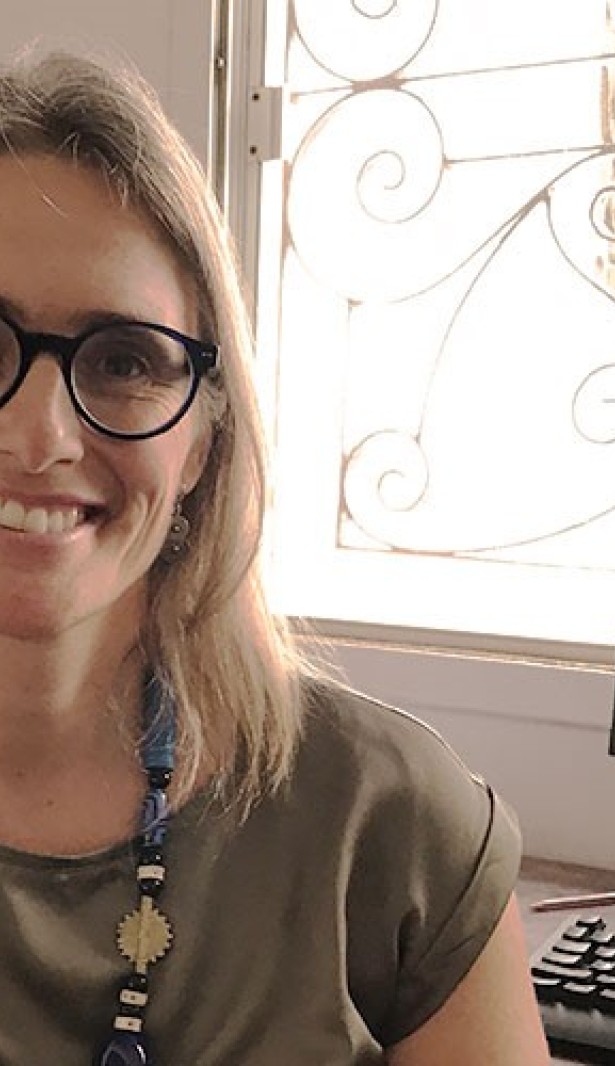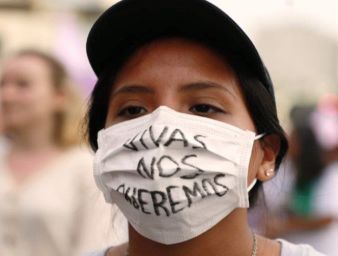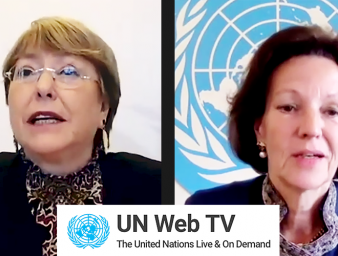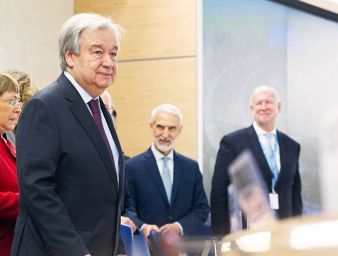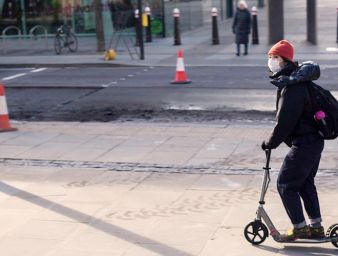Marlene Urscheler, doing human rights work during the COVID-19 pandemic
04 May 2020
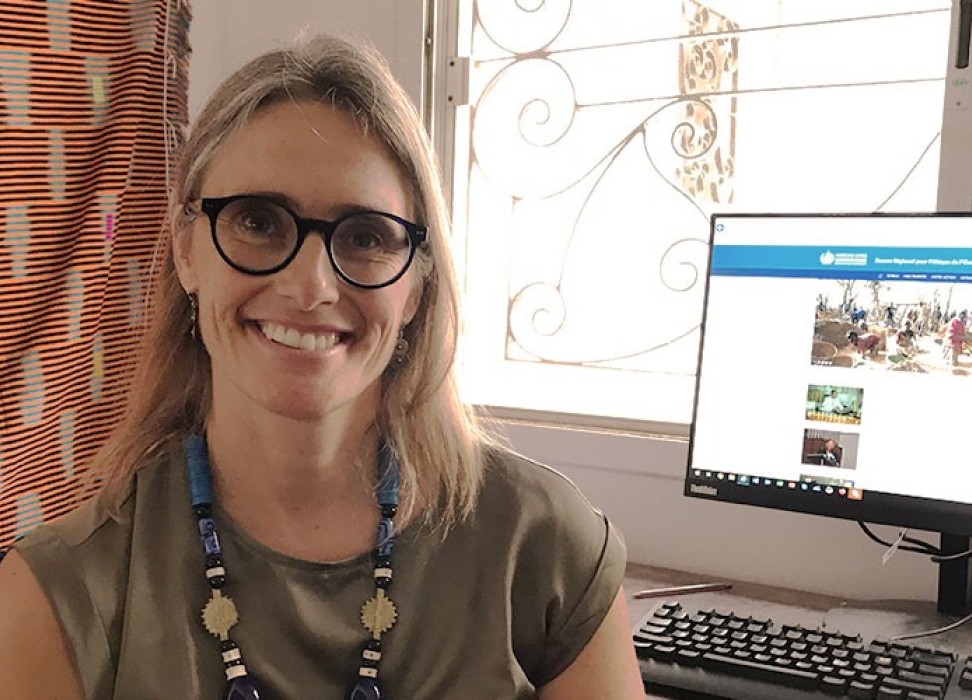
Over 6,200 cases of COVID-19 infections have been reported in West Africa and the UN family in the region has come together to support Governments’ responses to the pandemic.
All countries in the region have reported cases and, over the past few weeks, several have reported spikes in the increase of infections, as well as community cases. Mindful that the COVID-19 pandemic is challenging the strong health systems of high-income countries, serious concerns are being raised in West Africa where most countries’ health, political and economic systems also have to deal with inherent weaknesses to respond effectively to the pandemic.
Marlene Urscheler heads the Emergency Response Teamat UN Human Rights’ Regional Office for West Africa based in Dakar, Senegal. She was recently designated as the Office’s focal point for COVID-19 related issues in the region.
Q: How has COVID-19 affected your work?
COVID-19 has completely changed the way we work. First, in terms of not going to the office, working from home, having to deal with distance learning for kids at home and balance spouses’ work priorities. As a regional office, we are responsible for 16 countries in the region. Normally, half of the time we travel across the region to strengthen our contacts with the partners and Government authorities, and jointly organize workshops and activities. All of that suddenly, from one day to the other, just fell off. None of us really saw that coming and I think we were taken by surprise, so we needed to re-allocate ourselves.
I was quickly given tasks directly related to the Regional Office’s COVID-19 response. This involves participating in the coordination of efforts within a regional UN and civil society platform headed by the World Health Organization (WHO) and co-led by the UN Office for Humanitarian Affairs (OCHA). That platform serves as a space to share information and, through its six pillars structure, to provide support and guidance on the different aspects of the response to the pandemic. In one of the pillars, together we are trying to figure out an assessment of the priority issues of countries in the region - which ones should be given priority to - and apply objective criteria in this regard.
All the work that we invested in developing our work plans for months was undone and we sort of started from scratch. We had to revisit our work plans for the projects and our regular work as priorities and the possibilities to implement them have changed. We re-allocated resources to implement the adapted objectives. Some of the events we can readjust, but we also have to gage our partners’ willingness and possibilities to engage virtually. We also have to wonder, would we get the same results? We when organize three-four days seminars, people often mention the importance of networking during the breaks. In a virtual meeting that does not happen to the same extent.
Because of the pandemic, we are moving into a new area that involves more engagement with humanitarian actors with whom we may not have had such close contacts before. We found that for us it is easier to engage in areas where you have pre-established contacts and partnerships to build upon.
Q: What has the Regional Office been doing to protect the rights of people during this pandemic?
The role of UN Human Rights is to protect the rights of everyone and in the context of the pandemic a particular emphasis is given to the groups of people whose right to health may be most affected. For example, persons living with disabilities, how will we ensure that they have access to healthcare and regular needed check-up in situations of confinement? However, our work goes much beyond the right to health. For example, we need to consider how to ensure that the issue of sexual and gender-based violence is mainstreamed as, unfortunately, it is becoming more prevalent in situations of confinement. These are just two examples but we need to identify which are the most vulnerable groups and try to advocate, be their voice and speak up for them to ensure that no one is left behind. I think this is the role that the Office should play.
Another element that I think we need to be very mindful of is prevention, looking beyond the immediate and getting prepared. We are in a region where there are humanitarian crises and conflict in so many countries; there is a migration crisis, internally displaced persons, violent extremism… These contribute to a completely different area of concerns in the context of a pandemic. It would be difficult to assess the magnitude of the upcoming economic slowdown and to which degree it would affect certain groups of people disproportionately. The informal economy constitutes a large part of the economies in West Africa. The lockdowns, curfews and general economic crises disproportionately affected the workforce in the informal economy, as there is no social security such as unemployment benefits for them. We need to find a way to by adapting response measures in such a way that they don’t, once again, leave the most vulnerable behind, those that are always kept out; and that development, security and health don’t only benefit those that are already in a better situation.
The WFP (World Food Programme) and the FAO (the UN Food and Agriculture Organization) have recently produced predictive reports on food insecurity in the next three or six months in the region; the numbers they have put forward are very concerning. The travel restrictions in place render humanitarian access very difficult for goods and persons.
Q: Are there other human rights situations that your office monitors regularly that have been exacerbated, and are there new ones that you're considering now because of the pandemic?
An area that we are looking into is the issue of detention. In the region, there is huge overcrowding of many detention places, prisons specifically, and the spread of the virus was identified very early on as one of the risks for people in detention in such unsanitary situations. UN Human Rights has supported processes to have presidential pardons or get many detainees released, which was, in my view, a very positive measure taken by many Governments. We would have hoped the overcrowding of prisons would have been addressed anyway but, in that situation, the COVID-19 pandemic helped show that the overcrowding could become a liability for Governments, because if they don't release these people now, they might be faced with a much bigger crisis.
At the moment, almost every person’s rights are affected somehow by COVID-19, and there are so many issues we could work on and we should work on. We are so solicited, but we have to strategically choose to engage in areas where we have pre-established contacts, where we already have good partnerships and where we know we can contribute to something that would otherwise be overlooked.
4 May 2020
